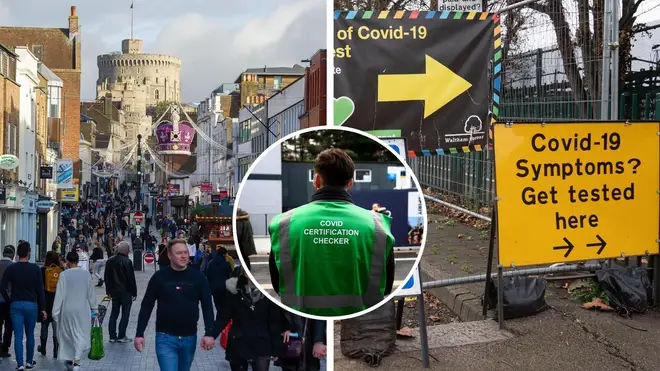
Clive Bull 1am - 4am
4 January 2022, 09:47 | Updated: 7 June 2023, 08:56

Covid-19 is beginning to 'plateau' in London, a leading expert said this morning, and there is "relatively good news" that the omicron variant is causing milder disease.
Professor Neil Ferguson said today he was "cautiously optimistic" about infection rates in London.
He said that infections in the 18-50 age group, which has been driving the Omicron epidemic, may possibly have plateaued, but that it is "too early" to say whether they're going down yet.
Professor Sir Andrew Pollard, director of the Oxford Vaccine Group, has said the UK is not yet completely over Omicron but "generally the news is relatively good from an overall perspective in that it does seem to be causing milder disease".
However, he said this does not mean the NHS can cope with a continuing increase in cases.
Read more: Several hospitals declare critical incidents as leader warns NHS 'in state of crisis'
Read more: Brits face back-to-work chaos on trains and at schools amid Covid staff shortages

No plans to cut self-isolation days, Minister tells LBC
Matthew Taylor, chief executive of the NHS Confederation, said there “may be a second peak after the new year” and warned cases were rising outside the capital, and said the most pressing challenge hospitals face at present is the number of staff absent due to Covid.
Mr Taylor's comments come after at least six hospital trusts declared critical incidents, where priority services may be under threat.
One of the hospitals affected is United Lincolnshire Hospitals NHS Trust, where "extreme and unprecedented" staff shortages are expected to result in "compromised care".
Chief executive of University Hospitals of Morecambe Bay, Aaron Cummins, also confirmed in a statement that the trust had declared an "internal critical incident".
Rail passengers meanwhile have been hit by disruption on the first working day of the year in England and Wales due to a combination coronavirus-related staff shortages and faults.
No London Overground services were able to run between Clapham Junction and Surrey Quays on Tuesday morning due to a fault on a train.
National Rail Enquiries warned passengers that a "problem under investigation" between Darlington and York was causing disruption between the stations.
This affected CrossCountry, London North Eastern Railway and TransPennine Express services.
Merseyrail services were suspended between Kirkdale and Kirkby following a power supply problem.
Urgent repairs were being carried out to replace part of the signalling system in Slade Green, south-east London, following an electrical fault.
The issue meant the line through the station towards Dartford was blocked, affecting Southeastern trains.
Network Rail tweeted that it sent technicians to Lewisham, also in south-east London, to fix a new set of points which "worked fine all night in testing and of course has gone wrong now".
The problem caused disruption to Southeastern services on one of the main lines into the capital.
Rail journeys across Britain were also being hit by many operators using reduced timetables in a bid to improve reliability after weeks of short-notice cancellations due to staff shortages caused by the coronavirus pandemic.
ScotRail implemented a temporary weekday timetable on Tuesday as the Omicron variant of Covid-19 has resulted in a "large number of absences".
More than 150 daily services have been cut, including on routes such as Glasgow to Edinburgh via Airdrie/Bathgate; Glasgow Central to Lanark; Edinburgh to North Berwick; and Edinburgh to Tweedbank.
Other examples include Southern not serving London Victoria until January 10, while CrossCountry has removed around 50 daily trains.
There are also concerns around the reopening of schools.
Secondary school students in England heading back to class today will have to wear face coverings during lessons.
The government is also urging youngsters to be tested twice a week because of the spread of the Omicron variant.
Professor Neil Ferguson said that schools reopening is likely to cause an uptick in coronavirus infections, but they will be mild.
He said: "The Delta infections in the last few months have been really driven by school-age children and by the older age groups in the population.
"Omicron slipped in the middle in 18 to 45-year-olds really but it didn't, as we heard, have much time to get into school children before schools shut and we expect to now see quite high infection levels, of mild infection I should emphasise, in school-age children.
"I think the good news here is it is certainly less severe, we think about one-third drop in the risk if you've never been infected before, never had a vaccine, about a one-third drop in the risk of just any hospital admission, probably a two-thirds drop in the risk of dying from Omicron, so substantially less severe and that has helped us, undoubtedly."